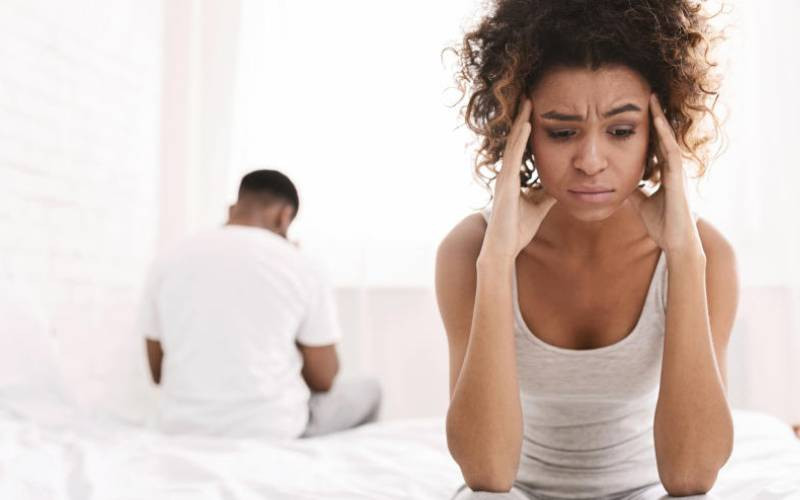
Dear Eve,
I am 20 years old and my boyfriend is 29. Love making has become a nightmare as I feel a lot of pain especially at the lower abdomen during the act. What could be wrong?
Mary
Hello Mary,
There can be several different reasons for that as indicated below and in no order. You haven't indicated how long you have been having sex with your current partner, your age of sexual debut (the first time you ever had sex) and whether this is a new problem or something has been an issue for you right from the beginning.
Given this, and your age, let me begin with the assumption that your current partner is also your first partner. If that is the case, then this could be a simple matter of your body getting used to the sensation of a fully erect penis inside it. Inadequate foreplay and lubrication can also cause pain during sex.
Another possibility is that your partner's penis could be longer than the length of your vaginal canal, which means that when he does penetrate, his penis hits against your cervix which can be very painful. The positioning of your uterus or a problem with your pelvic floor could both cause pain during sex.
You also don't mention whether you experience any other symptoms such as bleeding during or after sex, any fever, have heavy or discoloured vaginal discharge or any other symptoms. If these symptoms are present, another possibility could be that the pain is due to the presence of an STI (Sexually Transmitted Infection). An example of an STI that can cause lower abdominal pain would be PID.
PID – Pelvic Inflammatory Disease – is a bacterial infection that can affect a woman's ovaries, fallopian tubes, uterus or cervix. It is most commonly caused by chlamydia and gonorrhea, both of which are STIs. PID can cause serious complications and can be treated with a course of antibiotics so the sooner you treat it, the better.
In addition to a possible STI, you could have other underlying medical conditions such as fibroids (non-cancerous masses that grow in many women of child bearing age and whose location can cause pain during sex), ovarian cysts (fluid-filled pouches that form as part of every woman's menstrual cycle, and that often resolve themselves in most women.
For some women though, they can keep growing instead of resolving on their own), endometriosis/adenomyosis (the growth of uterine tissue inside and outside of the uterus. Pain is one of the key indicators of endometriosis and adenomyosis so it would make sense that the addition of a penis would increase the chances of pain).
An infection such as in your fallopian tubes (salpingitis) or even in your digestive tract or kidneys could also cause lower abdominal pain, as would sex during the beginning of your menstrual cycle or the middle of your menstrual cycle (ovulation). An ectopic pregnancy (a pregnancy that happens outside of the uterus, usually in the fallopian tubes; this would be considered a medical emergency that requires immediate medical attention) would also cause pain in your lower abdomen during sex.
Mary, I hope that you can see that the possibilities to the cause of your lower abdominal pain are varied and plentiful. It is for this reason that I recommend the following:
1. Make sure that you are well lubricated before and during sex. In the event that you are not, consider using a water based lubricant (not petroleum-based ones as they can degrade the material used to make condoms, if you're using any, in addition to increasing chances of developing UTIs since they trap bacteria inside you instead of letting it easily come out during your body's natural cleansing process).
2. Visit a gynaecologist. It is important to see a gynaecologist i.e. a doctor who specialises in a woman's anatomy. They would be able to examine you and recommend any tests as they deem necessary such as a PAP smear. A PAP smear is a simple test recommended for women over 18 years or who are sexually active; whichever comes first. A PAP smear is a useful tool that assesses for the presence of cervical cancer cells, including those that are caused by HPV (Human Papilloma Virus), another STI.
3. If your doctor gives you a clean bill of health but the pain continues, then please see a sex therapist (a mental health professional who also handles sexual function/dysfunction matters) so you can benefit from talk therapy
Our bodies are meant for sexual pleasure therefore sex in itself should not be a painful affair. My hope is that you will seek and ultimately find the most appropriate intervention for you.
Maggie Gitu is a marriage, family and sex therapist. Reach her on: [email protected] or via her
Facebook page: Maggie Gitu
 The Standard Group Plc is a multi-media organization with investments in media
platforms spanning newspaper print
operations, television, radio broadcasting, digital and online services. The
Standard Group is recognized as a
leading multi-media house in Kenya with a key influence in matters of national
and international interest.
The Standard Group Plc is a multi-media organization with investments in media
platforms spanning newspaper print
operations, television, radio broadcasting, digital and online services. The
Standard Group is recognized as a
leading multi-media house in Kenya with a key influence in matters of national
and international interest.



